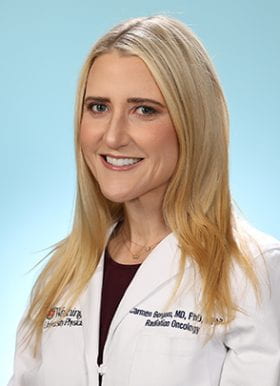
Education
- BS, Biology & Chemical Engineering: Massachusetts Institute of Technology, Cambridge, MA (1998)
- PhD, Cell Biology: Medical College of Wisconsin, Milwaukee, WI (2006)
- MD: Medical College of Wisconsin, Milwaukee, WI (2008)
- Residency, Radiation Oncology: Medical College of Wisconsin, Milwaukee, WI (2013)
Board Certifications
- Certified by the American Board of Radiology in Radiation Oncology (2014)
Recognition
- Clinical and Experimental Research in Radiation Oncology (CERRO) Meeting of the European Society for Radiotherapy and Oncology (ESTRO), Co-Chair (2024 – Present)
- United Nations Scientific Committee on the Effects of Atomic Radiation (UNSCEAR) CircuDis (Circulatory Diseases from Radiation Exposure), lead writer for the Pathology subgroup (2023 – Present)
- Washington University Siteman Cancer Center Emerging Leaders Council (2022 – Present)
- Chair, ASTRO Science Council Scientific Review Panel (2021 – Present)
- Elected as Councilor-at-large for Radiation Research Society (RRS) (2021)
- Michael Fry Research Award from the Radiation Research Society (RRS) (2021)
- Vice Chair, American Society of Radiation Oncology (ASTRO) Science Council Scientific Review Panel (2018 – 2020)
- Top Doctors in America (2018, 2019)
- Roentgen Residency Research Award, Radiological Society of North America (2012)
- American Board of Radiology Leonard B. Holman Research Pathway Fellow (2010)
- Churchill Scholarship, University of Cambridge (1999)
Clinical Interests
Breast Cancer
Biography
Carmen Bergom, MD, PhD, is an associate professor in radiation oncology. Dr. Bergom treats breast cancer patients, and she also has a translational research laboratory focusing on using innovative genetic models to improve the therapeutic ratio radiation therapy by identifying targets to enhance tumor radiosensitivity and minimize normal tissue toxicities, with a special focus on minimizing cardiac toxicity. Dr. Bergom obtained undergraduate degrees in Chemical Engineering and Biology from the Massachusetts Institute of Technology (MIT), a Master’s degree in Epidemiology at Cambridge University, and M.D. and Ph.D. degrees from the Medical College of Wisconsin (MCW). She completed her medical residency in Radiation Oncology at MCW. During her residency, she was named a Leonard B. Holman Research Pathway Fellow by the American Board of Radiology. Throughout her training and career, Dr. Bergom has been interested in coupling basic research findings with translational and clinical research. Dr. Bergom joined the faculty at WashU Medicine in 2020.
Research
Dr. Bergom is an R01-funded investigator focused on utilizing unique pre-clinical genetic models to improve the effectiveness of radiation therapy and decrease side effects from radiation exposure of normal tissues. Her research specifically focuses on using genetic models to identify factors in the tumor microenvironment that enhance the effectiveness of radiation therapy, as well as using these models to identify genetic variants that alter the sensitivity of the heart to radiation exposure. Her group has conducted the first genetic mapping studies to identify genetic modifiers of radiation-induced cardiac toxicity (Schlaak et al., Am J Physiol Heart Circ Physiol, 2019). These studies demonstrated that heritable genetic factors on rat chromosome 3 can greatly modify sensitivity of the heart to radiation-induced cardiac dysfunction. Additional studies have examined the roles of innate and adaptive immunity and mitochondrial dysfunction in these responses, as well as further genetically mapped the area of chromosome 3 responsible for altering sensitivity to cardiac radiation exposure. Similar genetic studies have also demonstrated that variants in rat chromosome 3 alter radiation sensitivity of breast tumors due to changes in the tumor microenvironment. Dr. Bergom’s laboratory employs a number of techniques for these studies, including genetic mapping, Next Generation Sequencing including species-specific RNA-Sequencing, and advanced pre-clinical models of tumor and normal tissue radiation exposure. These studies are providing potential biomarkers and therapeutic targets that may enhance tumor responses to radiation therapy and minimize radiation-induced cardiac function.